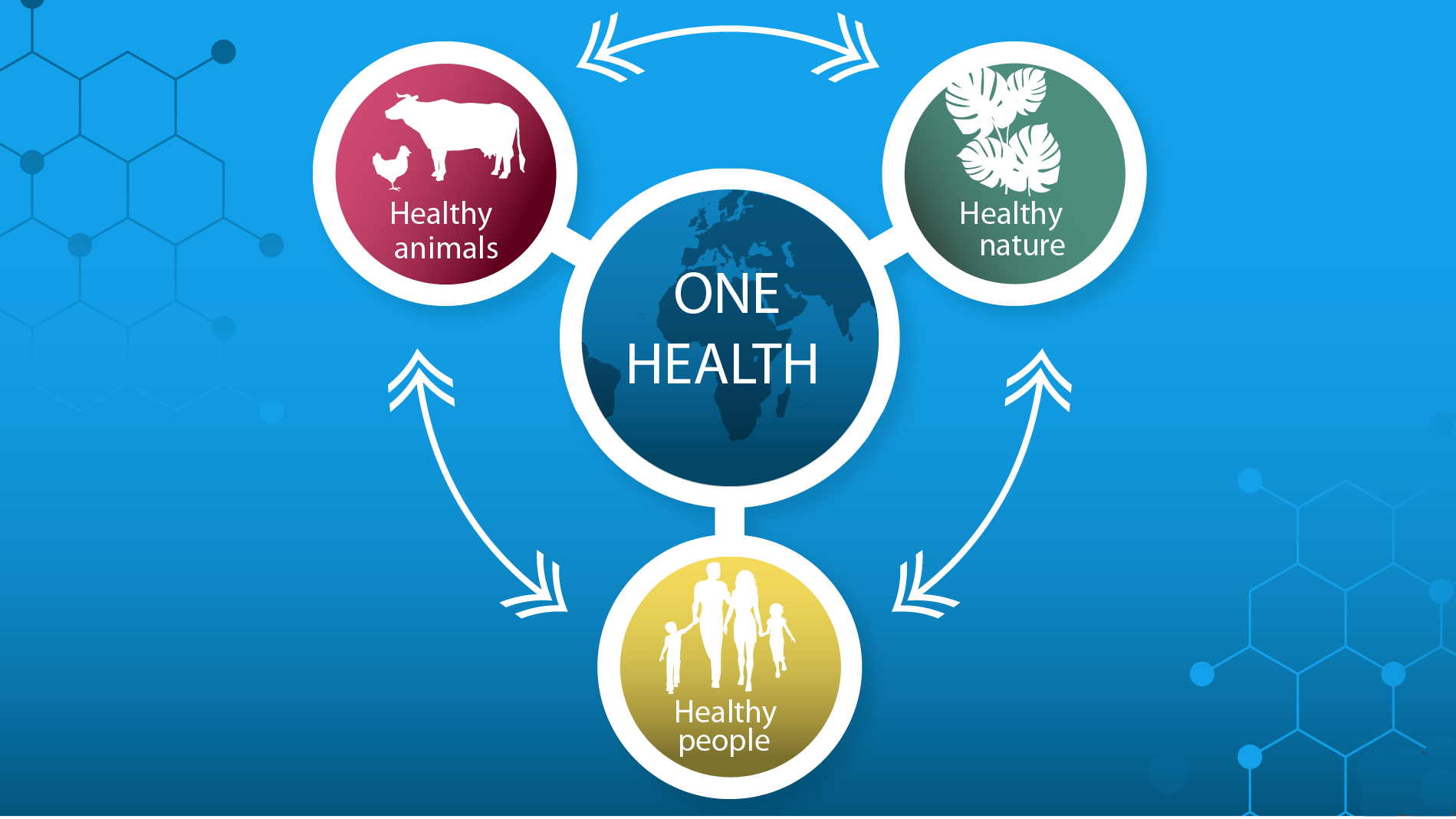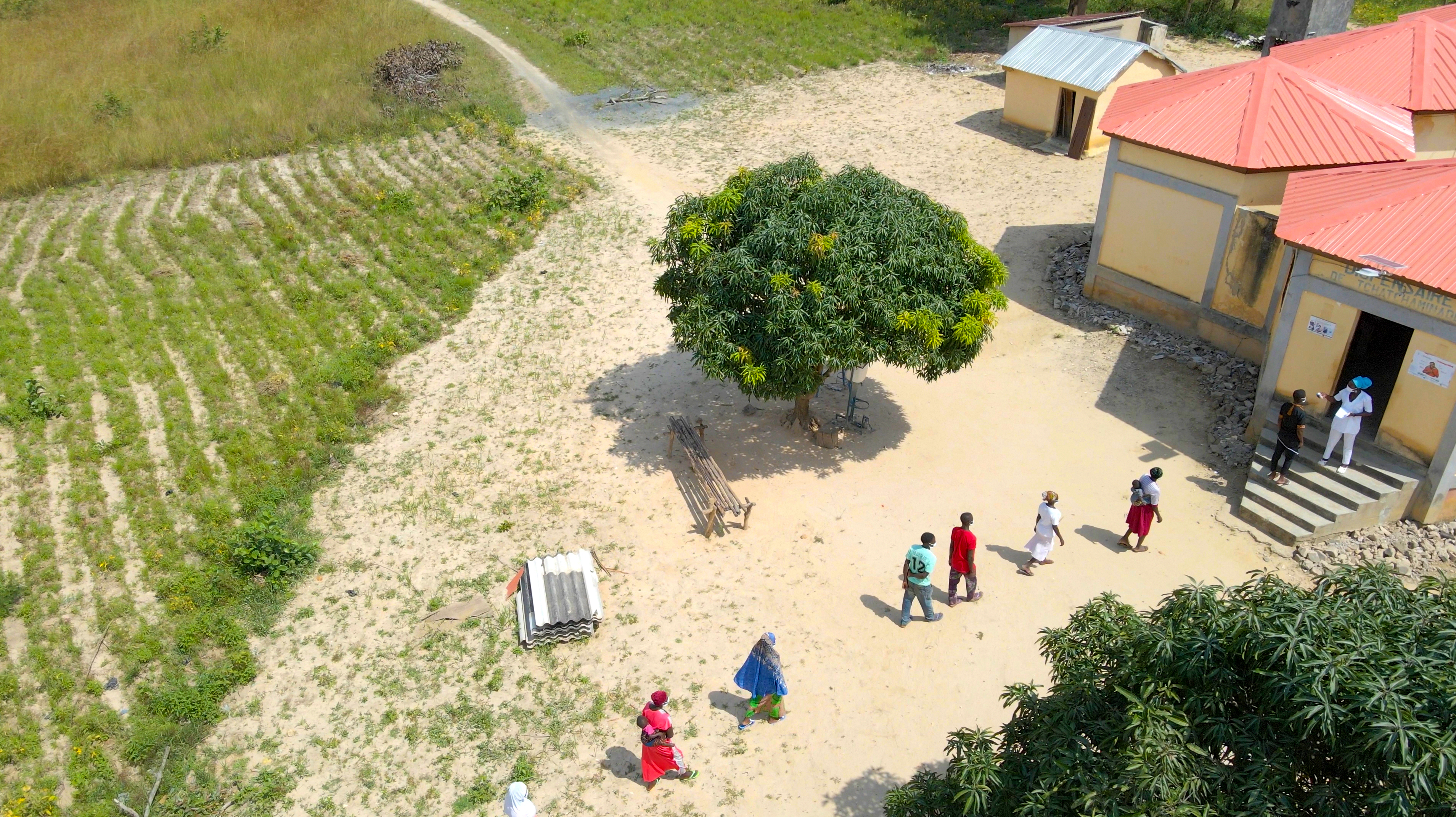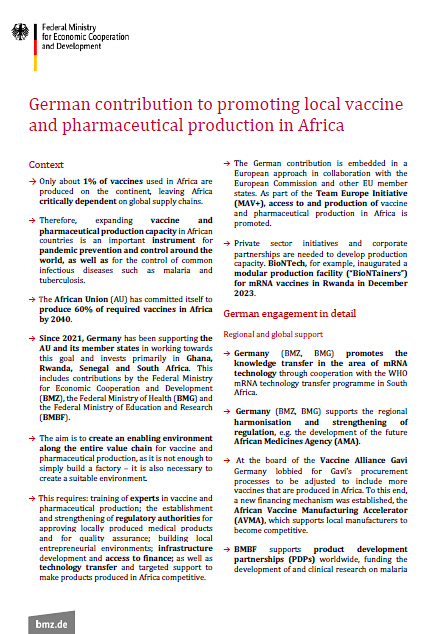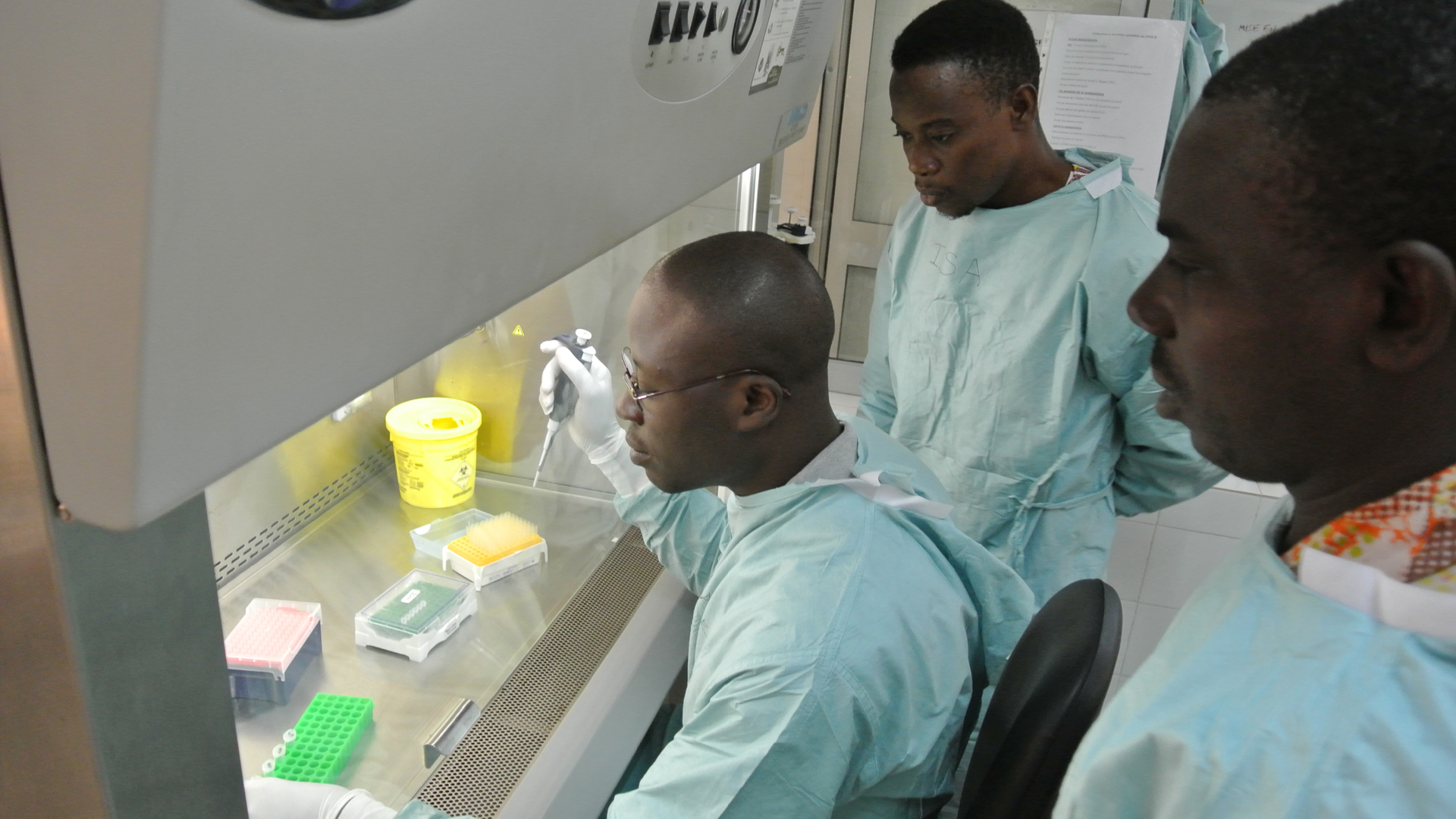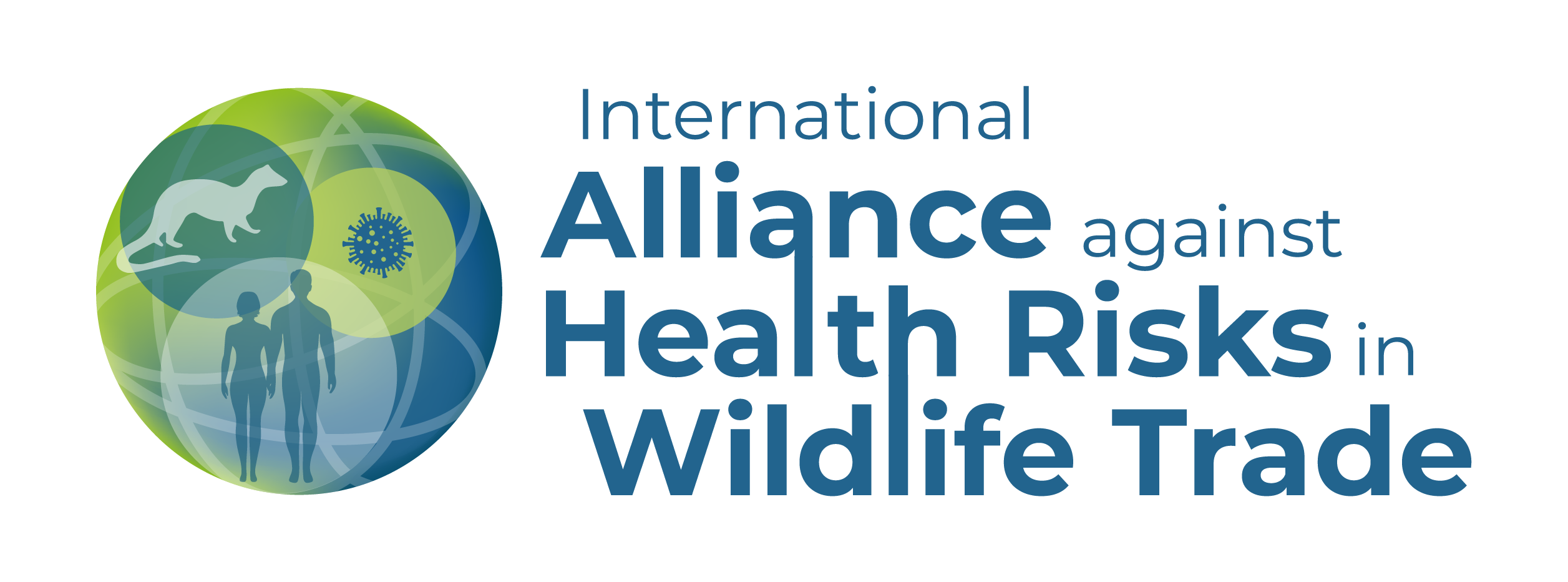Logo of the World Health Organization (WHO)
Copyright© United States Mission Geneva via flickr, CC BY-ND 2.0
Joint engagement to tackle pandemics
The pandemic also made the world realise how important it is to prevent infectious diseases with pandemic potential. So far, pandemic prevention has been neglected. Yet, it is more effective and less costly than a purely responsive approach. In view of the great number of pathogens with pandemic potential, Germany is working to expand preparedness and prevention worldwide. One focus in this work is the development and expansion of vaccine and pharmaceuticals production in Africa in order to improve people’s supply in health products.
Three quarters of newly emerged human infectious diseases originate in animals (they are known as zoonoses). That is why pandemic prevention depends on measures that lessen the risk of pathogens jumping from one species to another. Such measures can target people and animals (for example vaccinations, health protocols) or plants, food or infrastructure (for instance biosafety in animal husbandry).
Another important aspect is offsetting the human-made imbalance in the ecosystem. The One Health approach is very important in this regard because it recognises the interdependency of human, animal and environmental health.
Germany’s engagement in the global fight against the COVID-19 pandemic
It became evident very soon after the outbreak of the COVID-19 pandemic that an equitable access to medicines, vaccines and tests would be essential to save lives and stop the pandemic. That is why, in April 2020, Germany was one of the founders of the international cooperation platform ACT-A (Access to COVID-19 Tools Accelerator) for the development, production and fair distribution of COVID-19 vaccines, medicines and tests. ACT-A coordinated and implemented the global pandemic response until 2023. With a contribution of more than three billion euros, Germany was the mechanism’s second largest donor. The Federal Ministry for Economic Cooperation and Development (BMZ) has provided a total of 1.9 billion euros to ACT-A.
A large part of Germany’s funding has been channelled into the international vaccine platform COVAX, which has distributed more than 1.9 billion vaccine doses worldwide. The vaccines against COVID-19 were an important milestone in the global efforts to contain the COVID-19 pandemic. In order to speed up progress on global vaccination rates, Germany launched the “Last-Mile Initiative” on vaccine logistics during its G7 presidency in 2022. It has helped to bring vaccines and other medical goods even to remote regions and to disadvantaged population groups.
Now it is time to build on the ACT-A achievements to be prepared for the next pandemic. That is why Germany is actively involved in the international discussions in order to ensure that when a new pandemic hits the world access to medical products is equitable.
The BMZ’s engagement in pandemic preparedness and response involves:
- developing regional vaccine and pharmaceuticals productin in Africa (External link), to improve security of supply in future pandemics. This is mainly about strengthening regulatory authorities, expanding infrastructure and training experts.
- strengthening health systems to ensure non-discriminatory access to high-quality health services. This includes the local availability of preventive measures, diagnostic procedures and medicines and well-trained experts. A central element in strong health systems is having comprehensive basic immunisation programmes. That is why the BMZ is supporting the Global Fund to Fight AIDS, Tuberculosis and Malaria, Gavi, the Vaccine Alliance and the Pandemic Fund (External link) for improving global pandemic preparedness hosted by the World Bank.
- strengthening vaccine logistics and infrastructure through the Last Mile Initiative and financial support for the Access to COVID-19 Tools Accelerator (ACT-A). The BMZ is also supporting a programme by Gavi, the Vaccine Alliance, that facilitates additional COVID-19 vaccines in developing countries in 2024 and 2025.
- embedding the One Health approach in cooperation with partner countries and in high-level international processes, for instance the negotiations for a pandemic agreement or the work of the Pandemic Fund. The BMZ is also fostering cooperation on this issue between the World Health Organization (WHO), the Food and Agriculture Organization of the United Nations (FAO), the World Organisation for Animal Health (WOAH) and the United Nations Environment Programme (UNEP).
- expanding laboratory infrastucture (External link) – among other things, by deploying rapid-response teams known as German Epidemic Preparedness Teams.
- promoting digital strategies for data-based early recognition and real-time surveillance of infectious diseases and for effective outbreak control.
- assisting with hygiene and sanitation measures, training of medical staff, and providing special training for virus diagnostics and treating those who are infected.
Promoting vaccine and pharmaceuticals production in Africa
Only roughly one per cent of the vaccines being administered in Africa are actually produced there. This low rate of domestic production has created a heavy dependence on global supply chains – which resulted in significantly poorer access to vaccines at the beginning of the COVID-19 pandemic.
An important measure to improve supply security in future pandemics is therefore to develop vaccine and pharmaceuticals production in African countries. The African Union has set itself the ambitious goal of 60 per cent of the vaccines needed in Africa being produced within Africa by 2040.
Germany is making a significant contribution to achieving this goal. Since 2021, more than 550 million euros has been invested in different projects, especially in Ghana, Rwanda, Senegal and South Africa. This sum includes the BMZ contributions and contributions from the Federal Ministry of Health (BMG) and the Federal Ministry of Education and Research (BMBF). The German contribution is part of the Team Europe Initiative “Manufacturing and Access to Vaccines, Medicines and Health Technologies in Africa (MAV+ (External link))”, which has a total volume of 1.3 billion euros.
German Epidemic Preparedness Team (SEEG)
The SEEG teams bring together experts from the Bernhard Nocht Institute for Tropical Medicine, Charité university hospital, Berlin, the Friedrich Loeffler Institute (Federal Research Institute for Animal Health), the Robert Koch Institute and the Deutsche Gesellschaft für Internationale Zusammenarbeit (GIZ). They support partner countries of German development cooperation by training local health workers, advising governments on dealing with epidemics and pandemics and supporting efforts to procure laboratory material.
The German government deploys the German Epidemic Preparedness Team (SEEG) to prevent and address acute disease outbreaks. It was established in 2015 in response to the Ebola outbreak in West Africa. The teams are deployed on behalf of the BMZ, in cooperation with the Federal Ministry of Health and the Federal Ministry of Food and Agriculture. The SEEG has carried out some 60 missions since its inception in more than 30 countries in Africa, Asia, Europe and Central and South America (as at October 2023).
The work of the experts is based on the One Health approach. They assist our partner countries in diagnosing and containing outbreaks of diseases that could develop into an epidemic or pandemic at an early stage. This work also strengthens the health systems and supports the cooperation countries in their efforts to achieve the Sustainable Development Goals of the United Nations and develop core competencies for implementing international health regulations more successfully. This will prevent epidemics and pandemics and foster health security worldwide.
Alliance on wildlife trade
In 2020, the BMZ and the Federal Ministry for the Environment, Nature Conservation, Nuclear Safety and Consumer Protection (BMUV) initiated the founding of the International Alliance against Health Risks in Wildlife Trade (External link). GIZ is hosting the secretariat of the Alliance. The Alliance is aimed at preventing zoonotic infectious diseases from emerging and spreading along value chains in wildlife trade. The Alliance now has 230 members.
As at: 02/01/2024

